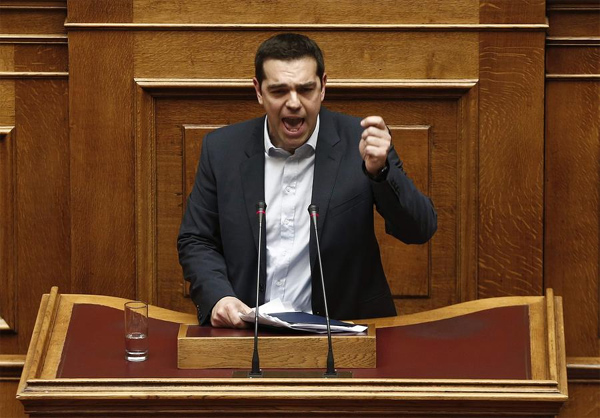ATHENS - Greece's new government will stick to its anti-austerity pre-election agenda and will not request an extension of the current bailout program which expires on February 28, Greek Prime Minister Alexis Tsipras said on Sunday during a closely watched policy statement at the parliament.
 |
|
Greek Prime Minister Alexis Tsipras delivers his first major speech in parliament in Athens February 8, 2015. [Photo/Agencies] |
Athens will instead seek a bridge agreement with international lenders until a new comprehensive deal will be signed after a renegotiation of the country's debt load, the Greek Premier added.
He expressed confidence that a "mutually beneficial solution" for Greece and its creditors will be found, arguing that his government's plan was "realistic" and that the Greek debt load was undoubtedly unsustainable.
"The government has no right to ask for an extension of the memorandums and an extension of austerity. It has no right to ask for an extension of a mistake and catastrophe, of an austerity program that has been recently rejected by the Greek people," Tsipras stated outlining the policies of the Radical Left SYRIZA-led administration which emerged after the Jan 25 elections ahead of a confidence vote scheduled for Tuesday night.
The main goals of the "government of social salvation", according to the Greek leader will be "to restore popular sovereignty, Greece's equal role in the institutional framework of the European Union, to deal with the humanitarian crisis, restore the dignity of Greek people, social justice and cultural rebirth."
The new government's policy program was divided into two main parts. The first lasts until June, when Athens expects to clinch a final comprehensive agreement with the European Union and the International Monetary Fund creditors. The second covers the rest of the four-year term during which gradually all pre-election promises will be fulfilled. "It is a matter of honor, credibility and democracy" to fulfill all election promises, Tsipras underlined.
The compromise not to rush and risk a derailment of fiscal consolidation was seen by political analysts in Athens as a signal for willingness to placate creditors who have reacted strongly to the prospect of backtrack from austerity and reform policies introduced by previous governments in return of bailout funding to keep Greece afloat over the past five years.
The government's top priority starting as of Wednesday was to address the humanitarian crisis which was fuelled by austerity since 2010, Tsipras said on Sunday.
He pledged free electricity, shelter, food and medical aid to poor households, the rehiring of some of the "unconstitutionally" sacked public servants and the reopening of ERT, the state broadcaster which was shut down in 2013 by the previous conservative-led government as an exemplary case of corruption and mismanagement.
Tsipras also pledged on Sunday that his government will work to kick start the economy in order to restore growth by combating tax evasion, corruption and bureaucracy and to implement a national plan for reforms which includes policies to address the plague of clientelism and waste of funds.
He promised a fair tax system, increasing the tax-free income threshold to 12,000 euros from 5,000 euros and introducing a tax on large properties.
The Greek Premier repeated a pre-election promise to raise the minimum wage to 750 euros from the current 586 euros, but gradually until 2016, and to reinstate the 13th pension for low income households earning less than 700 euros per month starting from Christmas 2015. He pledged that his government will restore workers rights.
In regards to privatizations, Tsipras stressed that the new administration will stop the "crime of the selloff of state wealth" and will instead welcome and support investments which will be to the benefit of the Greek state.
The Left leader announced plans to set up a parliamentary investigating committee to explore the events that led up to the Greek crisis and the memorandums.
Concerning international affairs, he called for a viable and fair solution to the Cyprus issue and the name dispute with Former Yugoslav Republic of Macedonia (FYROM) and promised an "active" Foreign Affairs policy which will highlight Greece's role as a beam of stability in a troubled region.
Finally, he announced that it was the government's "moral duty" to push forward demands for WWII reparations from Germany, as well as the return of a forced loan given by the central Bank of Greece to the Nazis.
Wrapping up his speech Tsipras asked all MPs to back his government's efforts to "win back the hope and lost dignity of the Greek people."
Tsipras' address came as international lenders have added pressure on the new government over the past two weeks to not roll back the commitments undertaken by previous governments.
Athens' request for a renegotiation of the Greek sovereign debt and a bridge deal has not been accepted warmly by its interlocutors.
Ahead of an emergency Eurogroup meeting on Wednesday and an EU summit on Thursday, Eurogroup's chief Jeroen Dijsselbloem stressed last week that Eurogroup does not do bridge agreements and Greece needs to apply for an extension by 16 February so that member states will have time to approve it.
In addition, the European Central Bank announced that as of February 11 it will no longer accept Greek state bonds as collateral for liquidity to Greek banks.
Financial analysts stressed that time is running out and Greece could face a cash crunch as early as March. Greek officials assured that there is not such prospect.
According to the first opinion survey on the government's first steps after the elections which was released this weekend seven out of ten Greeks support the government in the confrontation with lenders.
One in three does not believe Greece's exit from the euro zone is possible, while another 35 percent fears the prospect of default and Grexit, according to the survey which was carried out by the University of Macedonia in northern Greece for the television channel SKAI.